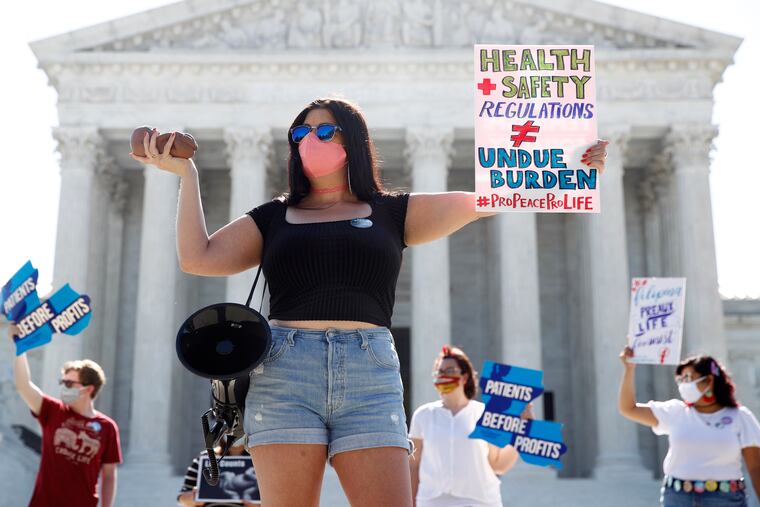Supreme Court strikes down Louisiana abortion clinic law
The Supreme Court has struck down a Louisiana law regulating abortion clinics, reasserting a commitment to abortion rights over fierce opposition from dissenting conservative justices in the first big abortion case of the Trump era

WASHINGTON — A divided Supreme Court on Monday struck down a Louisiana law regulating abortion clinics, reasserting a commitment to abortion rights over fierce opposition from dissenting conservative justices in the first big abortion case of the Trump era.
Chief Justice John Roberts and his four more liberal colleagues ruled that the law requiring doctors who perform abortions to have admitting privileges at nearby hospitals violates abortion rights the court first announced in the landmark Roe v. Wade decision in 1973.
The outcome is not the last word on the decades-long fight over abortion with dozens of state-imposed restrictions winding their way through the courts. But the decision was a surprising defeat for abortion opponents, who thought that a new conservative majority with two of President Donald Trump's appointees on board would start chipping away at abortion access.
The key vote belonged to Roberts, who had always voted against abortion rights before, including in a 2016 case in which the court struck down a Texas law that was virtually identical to the one in Louisiana.
The chief justice explained that he continues to think the Texas case was wrongly decided, but believes it’s important for the court to stand by its prior decisions.
“The result in this case is controlled by our decision four years ago invalidating a nearly identical Texas law,” Roberts wrote. He did not join the opinion written by Justice Stephen Breyer for the other liberals in Monday’s decision, and his position left abortion-rights supporters more relieved than elated.
The case was the third in two weeks in which Roberts, a George W. Bush appointee, joined the court’s liberals in the majority. One of the earlier decisions preserved the legal protections and work authorization for 650,000 immigrants who were brought to the U.S. as children. The other extended federal employment-discrimination protections to LGBT Americans, a decision that Justice Neil Gorsuch also joined and wrote.
In dissent on Monday, Justice Clarence Thomas wrote, “Today a majority of the Court perpetuates its ill-founded abortion jurisprudence by enjoining a perfectly legitimate state law and doing so without jurisdiction.”
Trump’s two high-court picks, Gorsuch and Brett Kavanaugh, were in dissent, along with Samuel Alito. The presence of the new justices is what had fueled hopes among abortion opponents, and fears on the other side, that the Supreme Court would be more likely to uphold restrictions.
The Trump administration had sided with Louisiana in urging the court to uphold the law. White House Press Secretary Kayleigh McEnany criticized the decision. “In an unfortunate ruling today, the Supreme Court devalued both the health of mothers and the lives of unborn children by gutting Louisiana’s policy that required all abortion procedures be performed by individuals with admitting privileges at a nearby hospital,” McEnany said.
Marjorie Dannenfelser, president of the anti-abortion Susan B. Anthony List, said, “Today’s ruling is a bitter disappointment. It demonstrates once again the failure of the Supreme Court to allow the American people to protect the well-being of women from the tentacles of a brutal and profit-seeking abortion industry.”
On the other side, support for the decision mixed with a wariness that the future of abortion rights appears to rest with Roberts.
Nancy Northup, president and CEO of the Center for Reproductive Rights, said Monday's decision by no means ends the struggle over abortion rights in legislatures and the courts.
“We’re relieved that the Louisiana law has been blocked today but we’re concerned about tomorrow. With this win, the clinics in Louisiana can stay open to serve the one million women of reproductive age in the state. But the Court’s decision could embolden states to pass even more restrictive laws when clarity is needed if abortion rights are to be protected,” Northup said.
In his reasoning, Roberts “signaled a willingness to lessen the legal protections for abortion,” University of Michigan law professor Leah Litman wrote on the Take Care blog. However, she also acknowledged that Roberts’ “emphasis on the importance of adhering to the Court’s prior decisions does not sound like the thinking of a person who is inclined to overrule Roe v. Wade.”
A trial judge had said the law would not provide health benefits to women and would leave only one clinic open in Louisiana, in New Orleans. That would make it too hard for women to get abortions, in violation of the Constitution, the judge ruled.
But the appeals court in New Orleans rejected the judge’s findings and upheld the law in 2018, doubting that any clinics would have to close and saying that doctors had not tried hard enough to establish relationships with local hospitals.
The clinics filed an emergency appeal at the Supreme Court, asking that the law be blocked while the justices evaluated the case.
Early last year, Roberts joined with the four liberal members of the court to grant that request and keep the law on hold.
Roberts’ vote was a bit of a surprise because of his earlier vote n the Texas case. It may have reflected his new role since Justice Anthony Kennedy’s retirement as the court’s swing justice, his concern about the court being perceived as a partisan institution and his respect for a prior decision of the court, even one he disagreed with. Roberts didn’t write anything explaining his position at the time of the Texas case.
The regulations at issue in Louisiana are distinct from other state laws making their way through court challenges that would ban abortions early in a pregnancy. Those include bans on abortion once a fetal heartbeat is detected, as early as 6 weeks, and the almost total ban passed in Alabama.